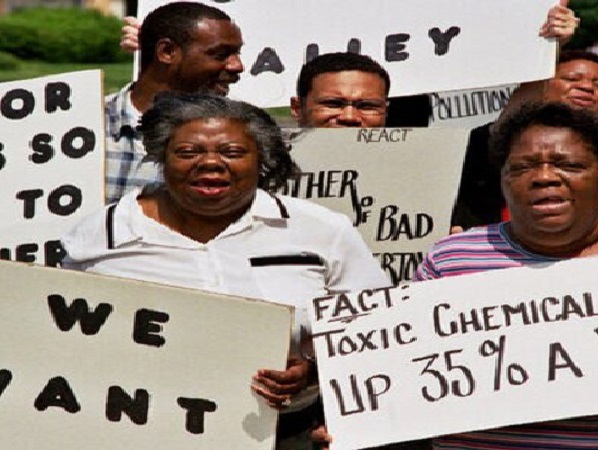Solicita ahora para formar parte de nuestra próxima grupo de Becados en Ciencia científicos comunitarios y líderes comunitarios.

Photo Courtesy of Eboni Cochran, ReACT
Rubbertown is the nickname given to an industrial area along the Ohio River at the southwest corner of the City of Louisville. It gets its name from tire and synthetic rubber plants that were built there during World War II near existing refineries. Factories in Rubbertown now produce a wide variety of chemicals and materials, employ hundreds of people and bring millions of dollars into the local economy.1
Because of this locus of rubber industry, residents in West Louisville have noticed and complained about the noxious fumes that they attribute to growing incidence of cancer, asthma and other respiratory diseases. Historically, Rubbertown is characterized by a large minority population – particularly African American. Although there have been state level air monitoring efforts, those ended in 2014.
This increasing industrial effects upon West Louisville led to the development of citizen organizations such as, Rubbertown Emergency Action (ReACT). The group advocates for more assessment and control of air emissions. As a founding member of the Coming Clean network, they are united with other citizen organizations across the country to ensure reform to the industrial chemical and fossil fuels industries so they are no longer a source of harm, and to secure systemic changes that allow a safe chemical and clean energy economy to flourish. In a recent accountability session co-hosted with Coming Clean and including the Environmental Protection Agency (EPA), ReAct found that there needed to be collaborative problem solving around air toxics.
Eboni Cochran is Deputy Director of Rubbertown Emergency Action (ReACT). [Bio and photo forthcoming.]
Amy Townsend-Small is Associate Professor in Environmental Science at the University of Cincinnati. Her current research explores the sources and fluxes of methane, a very powerful greenhouse gas. Her group is investigating whether the transition from oil and coal to natural gas as an energy resource will result in increased emissions of methane, with ongoing research in Ohio, Texas, and Colorado, as well as whether climate warming and changing hydrology could enhance methane emissions from lakes, with ongoing research in Lake Erie and the Arctic. She is a life member of AGU.
(c) 2024 Thriving Earth Exchange